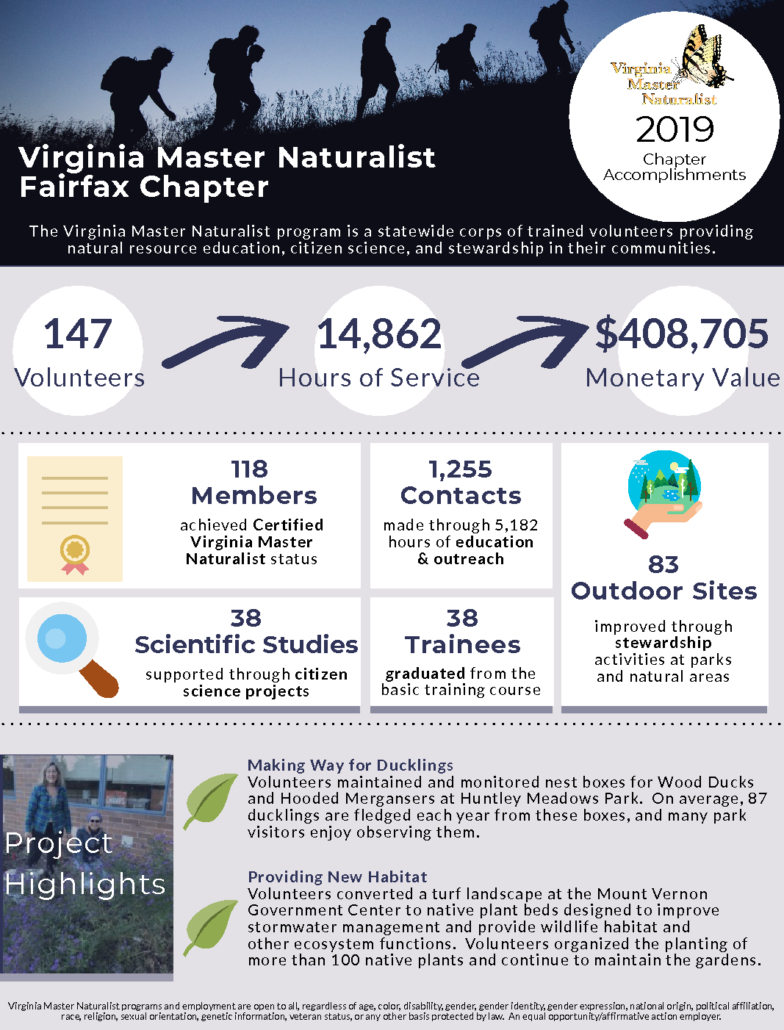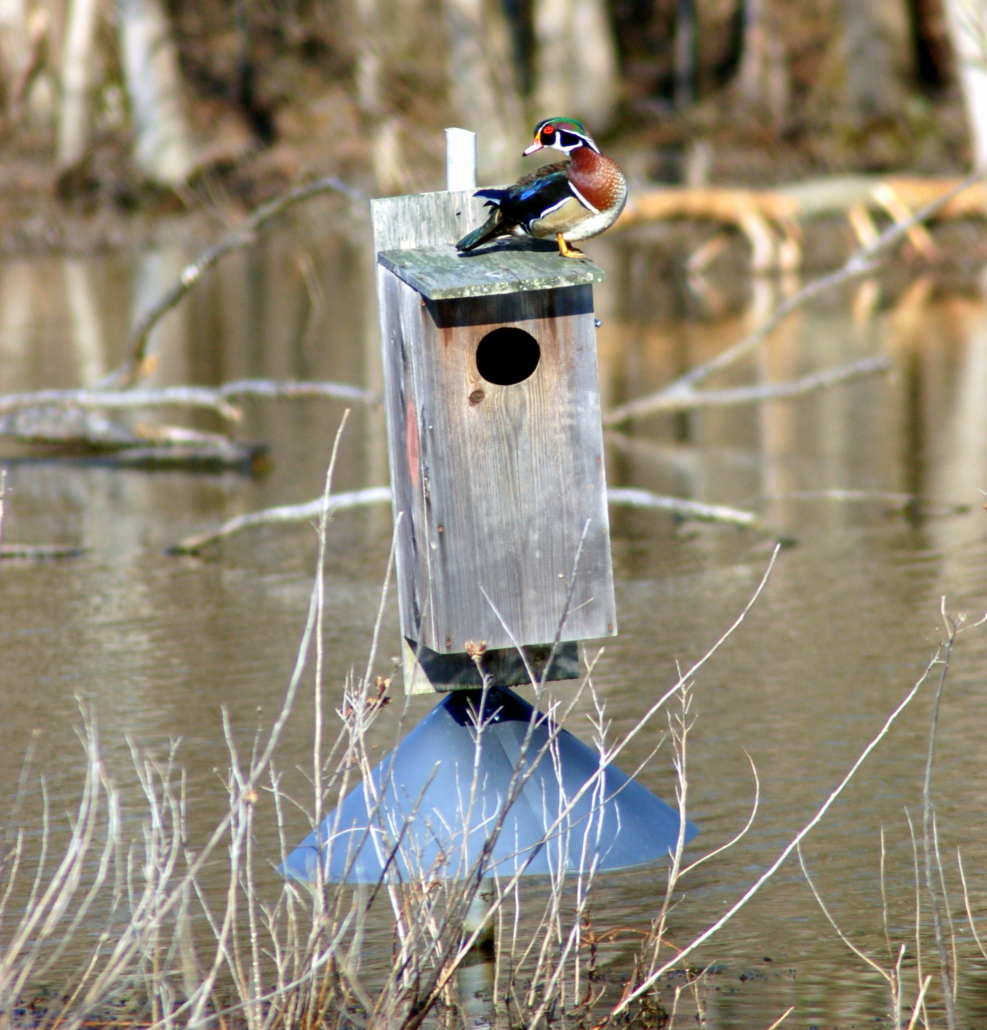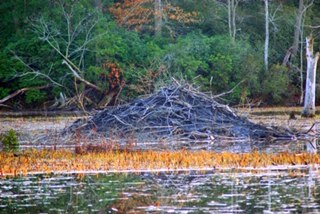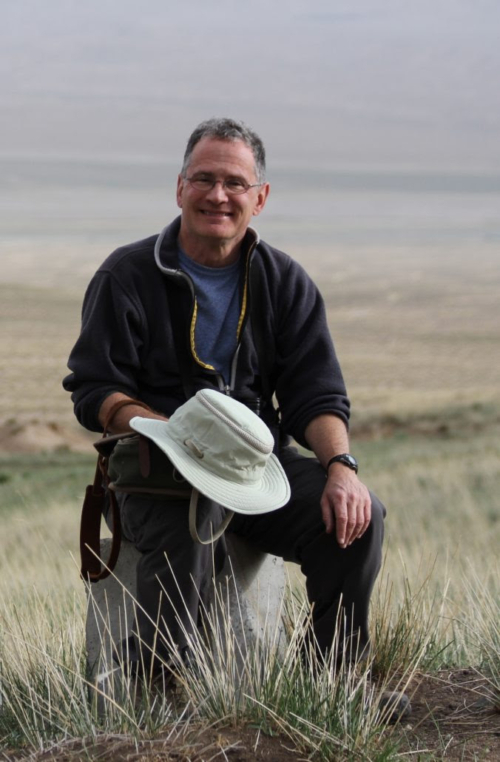VMN Annual Report Response for 2019, Fairfax Chapter
Our parent organization, Virginia Master Naturalists, has created an infographic of our chapter’s work from the annual report posted earlier.


Our parent organization, Virginia Master Naturalists, has created an infographic of our chapter’s work from the annual report posted earlier.

Article by Plant NOVA Natives
Now is the time to renew the Earth – and yourself, while you are at it! Most of us are aware of the benefits to ourselves of eating chemical-free vegetables, and to the environment of growing our own food and thus reducing our use of plastic and our share of the impact of shipping and refrigeration. What we may not realize is that home vegetable gardeners also can play an important role in our collective effort to reconnect our landscapes in a way that provides sanctuary for the birds and butterflies.
A home vegetable garden is not just a little grocery store. If we give back to the Earth what we take out, we create a system that is truly sustainable in the sense of being self-sustaining and friendly to the surrounding environment. The first principal of organic gardening is to grow the soil by avoiding damaging chemicals and adding compost, which we can make ourselves from yard and kitchen scraps. Soil is very much a living thing, full of living beings who have their own intrinsic value. It is also the place where many creatures such as fireflies spend a substantial part of their lives before emerging into the air where we become aware of them. Fungi in the soil extend the reach of plant roots and provide a network for exchanging nutrients, water and information between plants. The less we disturb (or poison) the soil, the better for the living world.
An equally important principal of organic gardening is that we need to build the ecosystem infrastructure to support a balance of insects. Sometimes people mistakenly understand that the way to do that is to purchase ladybugs or praying mantis egg cases, a practice that is not only futile (since they typically just fly away) but harmful, as the species for sale are usually Asian ones. Instead, the way to achieve a balanced ecosystem is to start with the plants that support it, namely locally native species. Although it is possible to intersperse annual vegetables with native perennials, what most gardeners do is plant them in separate beds. Ideally, we can plant a pollinator garden nearby, filling it with a diverse array of native flowers that bloom in succession from early spring to late fall.
Vegetable gardens will be relieved to find that a pollinator garden is a whole lot less work than what they are used to, since there is no need to improve the soil in most cases, less weeding is required, and cleanup simply consists of a little tidying in the spring of the dead leaves, stalks and seed heads that supported life all winter. Unlike zinnias and marigolds that need to be replanted every year and that have limited benefits, native plants not only provide nectar and pollen to the pollinators but also provide the food needed by their larvae. Over a few year period, a yard with many native plants will attract enough predatory insects to keep down aphids or other pests. Toads will eat the slugs, dragonflies will eat the mosquitoes, and crop yields will increase.
On top of all these benefits, any sunny space occupied by a garden is one less area of lawn contributing to stormwater run-off and degradation of our local streams and water quality.
To learn more about using native plants to support the ecosystem, visit the Plant NOVA Natives website and the section on Vegetable Gardening for Earth Renewal. And for a quick pick-me-up, enjoy our one minute video on getting closer to nature in your garden while social distancing.
Budburst brings together researchers, horticulturists, and citizen scientists on a shared journey to uncover the stories of plants affected by human impacts on the environment. Budburst tells these stories through data collection, data sharing, education, and personal connections.
Budburst citizen scientists work together with research scientists, educators, and horticulturists to answer specific, timely, and critical ecological research questions by making careful observations of the timing of plant life cycle events, also called phenophases. These life events differ depending upon the type of plant, but usually include leafing, flowering, and fruiting phases of plants as well as leaf color and senescence.
Two-day course
13 & 14 April 2020
12-2:30 pm each day
NAI members $75/Nonmembers $100
Register here
The National Association for Interpretation presents a program to discuss the question, how can we be more effective interpreters with participants from cultures other than our own? Interpretation has both the opportunity and a responsibility to be more inclusive of all communities and to question dominant and privileged cultural perspectives. In this interactive virtual session, participants will examine privilege and bias as it pertains to interpretive planning and programming. Participants will reflect on individual and organizational practices and develop strategies for creating engaging and meaningful programming for diverse audiences.
*Reflect upon how personal values, biases and assumptions can impact the quality of programming that we create.
*How to identify Bias in instructional materials.
*Strategies for creating a culturally-responsive programming.
Parker McMullen Bushman is the VP for Community Engagement, Education and Inclusion at Butterfly Pavilion in Westminster, CO. Parker’s background in the interpretation, conservation, and environmental education fields spans 22+ years. Parker has a passion for justice, accessibility, and equity issues. In addition to Parker’s role at Butterfly Pavilion she is also the founder of a DEI consulting firm called Ecoinclusive, the creator of Earth KWEEN and the founder of Summit for Action.
Jerry Nissley
“I scarcely know where to begin…”: The opening line in Jack London’s, Sea-Wolf. This 1904 story develops around a self-indulged, self-professed gentleman of the times, Humphrey van Weyden, who decides to visit a relative across the bay. The fateful day he boards the ferry from Sausalito to San Francisco, the bay is shrouded in dense, preternatural fog. So much so that boats could only navigate using compass, speed, and distance –“a mathematical certainty“, right? Ergo the inevitable transpires–in spite of, or perhaps because of, the cacophony of navigational bell buoys and ship’s fog horns, the ferry is suddenly struck amidships by a steam schooner crawling in against the tide.
Chaos prevails and young Humphrey barely has time to secure his life jacket before he jumps/falls from the fast sinking ferry into the frigid waters of the bay. Hypothermia is a cruel, uncaring beast, and the weak, water-logged human bobber is quickly carried towards the Golden Gate by fast-moving current caused by the ebbing tide. Despair and hopelessness lead to delirium and unconsciousness; yet at the last possible moment Humphrey is plucked from the water by a passing sealing schooner, the Ghost, on its way to Japan. The Ghost’s intractable captain, Wolf Larsen, does not return Humphrey to shore but instead indentures him for the duration of the voyage.
I love classical symbolism. I recalled that story while I was on a four-hour kayak trip the Monday before our current executive order to lock-down. To me the opening scene in Sea-Wolf is analogous to the Corona-virus situation we are in today. Our carefree lives have been hit amidships by a runaway schooner-virus; knocked into treacherous waters and after floundering for a time, we now find ourselves confined to our boat-houses under incommodious restrictions. Are we all now symbolically Humphrey van Weyden indentured by a viral personification of Wolf Larsen? Will we all be better versions of ourselves once we endure this indentured servitude?
I scarcely know how to continue… for alas, I did not sit down to write specifically about Humphrey van Weyden or Wolf Larsen. I sat down to write about how through all of the prevailing current events, spring continues to flourish and how I am encouraged by Nature’s example of fortitude. An example worth emulating.
Prior to restrictions, I was able to visit both Huntley Meadows Park (HMP) and Mason Neck State Park (MNSP) several times as a volunteer and as a casual visitor/user. At HMP I observed the hoodies and the woodies, the pins and the shovelers, the muskrats, osprey, snake-heads, spotted salamanders, assorted reptiles and migrating birds continue the cycle of life directly up in the face of the “Wolf“.

Kayaking at Mason Neck State Park, I observed that emergent vegetation is starting to show through the mud in Kane’s Creek. Spatterdock, cattails, pickerel weed and swamp mallow are starting to form along the water’s edge. Hopefully kayak tours will start up again in the summer months. Whether that happens or not, osprey, eagles, red winged blackbirds and beaver continue nesting/lodging rituals as if they plan to stay another year. I floated up to copious painted turtles adorning the logs like jewels, soaking in vitamin D. In the coves I sensed the sibilant swirl of pre-spawn fish around fallen trees in search of food and nesting sites. They, too, are planning to stay for the year.

Oh yes indeed — our kindred spirits, Flora and Fauna, embrace us. They show us there is a great deal of beauty and emerging hope all around. Perhaps we need to use our God-given senses to discern this — hear and distinguish the cries and calls, taste the Coral honeysuckle, smell the Sweetspire, see and perceive changing patterns, touch the morning mist. We need to be smart, stay safe and get through our “indentured servitude”. Our short-term restrictions do not even compare to Mr. van Weyden’s protracted ordeal and he, “… discovered his own legs and learned to stand on them“.
As a closing solicitude, consider Mr. van Weyden’s own contemplation as the crew emerged from a particularly trying ordeal at sea, “One thing I was beginning to feel, and that was I could never again be quite the same man I had been. While my hope and faith in human life still survived Wolf Larsen’s destructive criticism, he had nevertheless been the cause of change in minor matters. I had learned to look more closely at life as it was lived… to emerge from the realm of mind and idea and to place certain values on the concrete and objective phases of existence.“
In addition to VMN’s normal monthly Continuing Education webinar series, this month they are adding a “High Five from Nature” series. Don’t we all need a little encouragement from nature in our lives right now?
In each webinar, presenters will go over five species or concepts on a theme. These will be somewhat informal webinars of varying lengths, from 20 minutes to an hour. They’ll focus on Virginia species and on seasonal observations. We will record them and provide links to the recordings from our web site.
Please visit the web page for the Zoom link and Meeting ID for each webinar.
The Current Lineup
Five Frogs to Recognize by Ear
Five Needled Trees (Plus 5 More as a Bonus)
Five Native Shrubs
Five Dragonflies
Five Measures of Stream Quality That Have Nothing To Do With Water
Five Ferns
…and more! We will be adding additional High Five webinars in the coming weeks. If you or someone you know would like to be a High Five presenter, contact Michelle Prysby.
Each of these webinars is listed with its separate Zoom link on our website.
FMNs can get credit for attending these webinars under: A Special Webinar Series for VMNs Stuck at Home
Friday, April 24, 6:30 PM – 7:30 PM
This Clifton Institute program is online. Please register if you would like to watch live so we can communicate and share links via email.
Participants will listen to the songs of each of the migratory warblers that pass through our region in spring, while looking at spectrograms to help visual learners identify differences in similar songs. We will also briefly discuss habitats where breeding warblers can be found in our area and cover a handful of other migrants such as vireos and thrushes. This workshop will be of interest to birdwatchers of all skill levels. It will definitely be more fun than listening to a warbler song CD in your car! Photo by Cameron Darnell.
Friday, April 10, 7:00 PM – 8:30 PM

No Way Home: The Decline of the World’s Great Animal Migrations, by David Wilcove, exposes readers to the wonders and perils of animal movement across the landscape.
Clifton Institute offers multiple online options for participation, including a Facebook discussion group and a live online meeting at the original time. If you are interested in participating live, please register so they have your email address.
Alison Zak will be interviewing author David Wilcove and then sharing the recording with the group, so please email any questions for the author to [email protected].
Dr. Wilcove is a professor of ecology, evolutionary biology, and public affairs at Princeton University. The primary question driving his research is “How do we find room for biodiversity in an increasingly hot, hungry, and crowded world?” He is the also the author of The Condor’s Shadow: The Loss and Recovery of Wildlife in America (1999).
Was Tuesday, April 7, 7:00 PM – 8:00 PM
Here is the link to the recording: https://vimeo.com/405546899
Join the Clifton Institute in celebrating International Beaver Day!
Alison Zak will give a live, online presentation on the challenges and benefits to coexisting with beavers. Please register if you would like to watch live so we can communicate and share links via email. The presentation will be recorded if you are interested but can’t tune in live. Photo by Amy Johnson.
FMNs get CE credit: International Beaver Day: Online Presentation and Pond Sit
Because of the pandemic, the DC Environmental Film Festival is streaming its movies through the end of March. Most are free to watch.
About the festival: The Environmental Film Festival in the Nation’s Capital (DCEFF) is the world’s premier showcase of environmentally themed films. Since 1993, its mission has been to celebrate Earth and inspire understanding and stewardship of the environment through the power of film.
Each March in Washington, D.C., they host the largest environmental film festival in the world, presenting 100+ films to audiences of more than 20,000. Collaborating with over 110 partners, including museums, embassies, universities, and theaters, the Festival is one of the leading annual cultural events in Washington, D.C., winning the 2017 DC Mayor’s Award for Excellence in Creative Industries.
